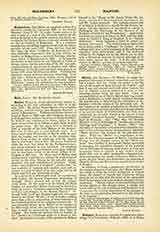

Malaga, Diocese of (MALACITANA), Spain, by the Concordat of 1851 made a suffragan of Granada, having previously been dependent on Seville. Malaga was the Malaka of Strabo and Ptolemy and the Malaca faederatorum of Pliny. It was important during the Carthaginian period, because a municipium under Roman rule, and under the Visigoths was made an episcopal see. The earliest known bishop was Patricius, consecrated about 290, and present at the Council of Eliberis. Hostegesis governed the see from 845 to 864. After the battle of Guadalete the city passed into the hands of the Arabs, and the bishopric was suppressed. Malaga then became for a time a possession of the Caliphate of Cordova. After the fall of the Omayyad dynasty, it became the capital of a distinct kingdom, dependent on Granada. In 1487 Ferdinand and Isabella besieged the city, which after a desperate resistance was compelled to surrender; and, with the Christian religion, the episcopal see was restored. The first bishop after the restoration was Pedro Diaz. The see was vacant from 1835 to 1848. The present incumbent is Bishop Juan Munoz y Herrera, born at Antequera, in the Diocese of Malaga, October 6, 1835.
The city of Malaga is the capital of the maritime province of the same name and, next to Barcelona, is the most important seaport on the Spanish Mediterranean coast. It lies at the southern base of the Axarqua hills, on the left bank of the Guadalmedina. The climate is mild and equable, the mean annual temperature being about 66° Fahrenheit. For its clear sky and broad expanse of bay the city has been compared to Naples. Since 1892 the harbor, which had been obstructed, has been cleared and improved, and from it are shipped the quantities of produce—grapes, oranges, almonds, oil, and wine—for which this district is famous. The cathedral, in the Graeco-Roman style, stands on the site of an ancient Moorish mosque. It was begun in 1528 and completed in 1719. Since the Concordat of 1851 the Cathedral Chapter has numbered 20 canons and 11 beneficed clerics. There are in the diocese (1910) 520,000 Catholics, a few Protestants; 123 parishes, 481 priests, and 200 churches and chapels. The Augustinian Fathers have a college at Ronda; the Piarists are engaged in teaching at Archidona and the Brothers of St. John of God have schools at Antequera, at which place there is also a Capuchin monastery. In the town of Malaga there are convents for women, including Bernardines, Cistercians, Augustinians, Poor Clares, Carmelites, and Dominicans. The Little Sisters of the Poor maintain homes for the aged and infirm at Malaga, Antequera, and Ronda.
BLANCHE M. KELLY

